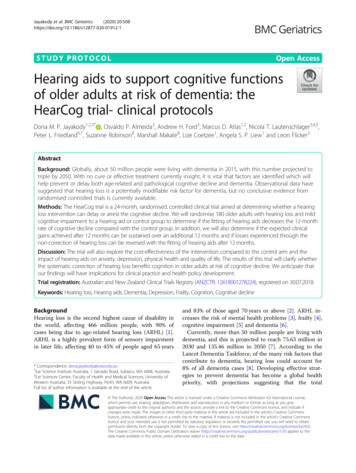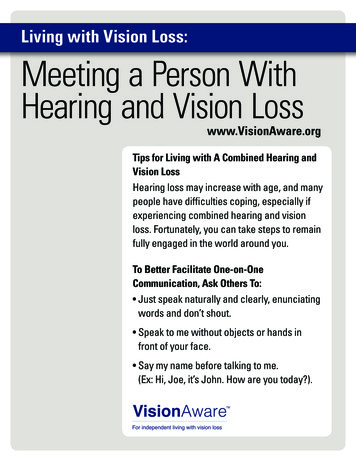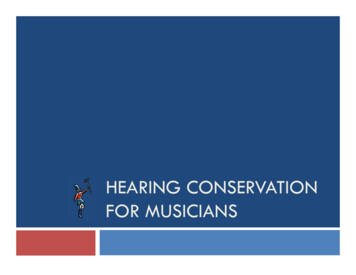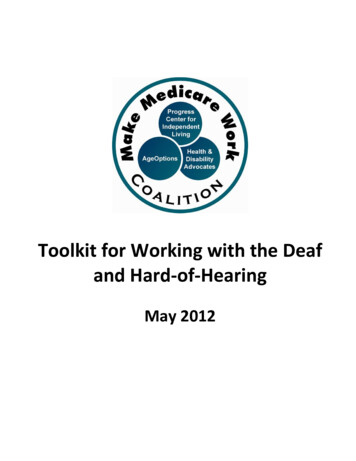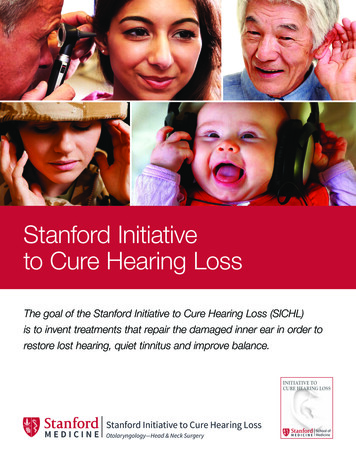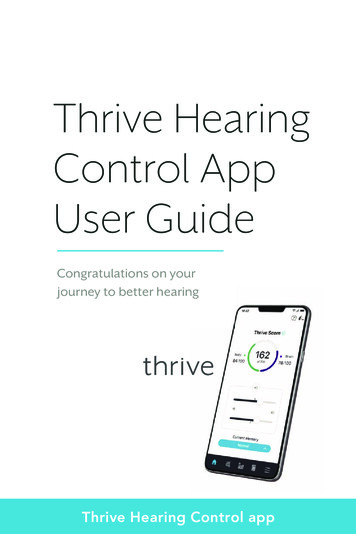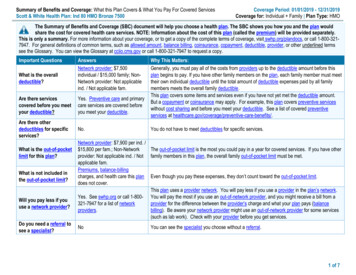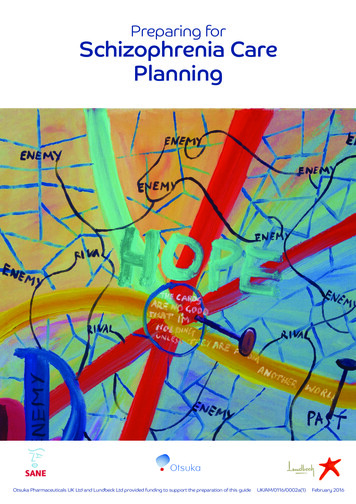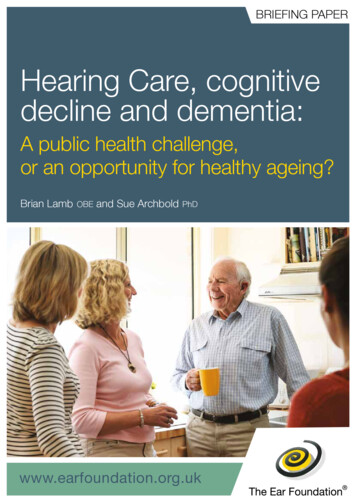
Transcription
BRIEFING PAPERHearing Care, cognitivedecline and dementia:A public health challenge,or an opportunity for healthy ageing?Brian LambOBEand Sue ArchboldPhDwww.earfoundation.org.uk
What do we know about hearing loss,cognitive decline and dementia?1As the ageing population grows,the numbers of those with hearingloss, cognitive decline and dementiaare increasing across the world,leading to urgent public health andsocial issues. (Kingston et al 2018) Research shows:Over 466 million adults experiencedisabling hearing loss and this numberis rising, with a cost globally of 750 billion per annum.(World Health Organization 2016a) Over 50 million people above 65 years of age have beendiagnosed with dementia, and that number is expected to triple by2050 due to the rising number of older people. The cost of caringfor those with dementia in 2015 was approximately 820 billion,and 85% of those costs were related to family and social costs.(Livingston et al 2017, World Alzheimer Report 2016)Hearing loss is now understoodto be mechanistically linkedwith the risk of cognitivedecline and dementia, butthese implications of hearingloss often go unrecognized.(F Lin, M Albert 2014)Hearing loss and its associationwith cognitive declineand poor health thereforepresents one of the largestpublic health challenges weface but the implicationsoften go unrecognised andunaddressed. We need toaddress this growing challenge,in line with the WHO resolutionon hearing loss (World HealthOrganization 2016b) and to developnew approaches to hearingcare in the context of updatedapproaches to healthy ageing.(Beard et al 2016)Hearing loss is believed to directlyincrease the risk of cognitivedecline and dementia throughthe effects of hearing loss on thebrain and social isolation.(F. Lin, M. Albert 2014)In Europe, over 52 million peoplesuffer from hearing loss.(EHIMA 2016, Lamb et al 2017)Approximately one-third of peopleover 65 years of age experiencedisabling hearing loss.In developed countries, hearingloss is the fourth most commoncause of years lived withdisability. (Wilson et al 2017)For those over 70 years ofage, hearing loss is the mostcommon cause of years livedwith disability. (YLD) (GBD 2015Disease and Injury Incidence andPrevalence Collaborators 2016)Hearing loss in adulthoodis linked to higher rates ofunemployment, depression,greater cognitive decline,greater risk of falls and comorbidities when comparedwith peers with normal hearing.As with hearing loss, dementiaand cognitive dysfunctioncontribute to falls, length of stayin hospital, more intensive nursingcare, and poorer recovery aftersurgery. (Pichora-Fuller et al 2015)1 Some degree of cognitive decline (loss of thinking and memory abilities) can be normal as we age. When a cognitive impairmentbecomes severe enough to interfere with daily activities, a person is considered to have dementia. Multiple different risk factors anddiseases can damage the brain and lead to cognitive decline and dementia over time.2HEARING, DEMENTIA AND COGNITIVE DECLINE: A PUBLIC HEALTH CHALLENGE FOR HEALTHY AGING?
Links between hearing lossand cognitionEmerging evidence has provided new insights into hearing health asa key part of healthy ageing. Hearing loss impairs communication,has been linked to reduced social support from others and lonelinesswhich, in turn, could increase health risks. More specifically,communication and social connectedness are critical to brain health,addressing dementia and maintaining cognition. Hearing well matters.Focusing on hearing loss presents major opportunities for healthsystems to invest in healthy aging and for the public to take actionabout their hearing, particularly as they age. An analysis of studies found that age-related hearing loss is apotential risk factor for cognitive decline, cognitive impairment,and dementia. (Loughrey et al 2018) In other meta-analyses(Ford et al 2018, Thomson et al 2017) and in longitudinal studies,(Davies et al 2017) an increased risk of incident dementia wasassociated with hearing impairment. People with mild hearing loss are twice as likely to developdementia as people without hearing loss, and the riskincreases fivefold for people with severe hearing loss.(Lin et al 2011, 2013) Evidence from imaging studies showing that individuals withhearing impairment have higher rates of brain atrophy inthe right temporal lobe and reductions in total brain volume,compared to individuals without hearing impairment.(Lin et al 2014) A large study among nearly 38,000 older Australian menfound a 69% increased risk of dementia for those who reporthaving a hearing loss compared to counterparts with normalhearing. (Ford et al 2018) In a matched cohort study using administrative claims data,hearing loss was significantly associated with an increased10-year risk of dementia. (Deal et al, 2019) Over 60% of adults living with dementia will have also havea hearing impairment (Nirmalasari et al 2017) and over 90% ofadults living with dementia in aged care will have a hearingimpairment. (Hopper et al 2016) People who have dementia and hearing impairment havepoorer functional ability (Guthrie et al 2018) and a more severecommunication impairment (Slaughter & Bankes 2007) as comparedto individuals who have dementia and no hearing impairment.THE EAR FOUNDATION 2019Source: Livingston et al 2017, The LancetThe recent and globally-acclaimed“Lancet Study” (Livingston et al 2017)concluded that mid and late-lifehearing loss may account for up to9.1% of preventable dementia casesworldwide and is one of the mostpotentially modifiable risk factorsfor dementia.3
Can addressing hearing losshelp maintain cognitive function?More research needs to be undertaken; however, agrowing body of evidence suggests that those withhearing loss who use hearing aids, cochlear andother hearing implants, may have a reduced risk ofcognitive decline and other poor health outcomesthan those who do not use hearing aids. However,because past studies have not been randomizedcontrol trials, it is difficult to know if those who selfselected to use hearing aids have other characteristicsthat may protect cognitive health. Ongoing researchis investigating the possibility that hearing technologymay be able to attenuate cognitive decline. Preliminaryevidence comparing those who use to those who donot use hearing devices is promising.“Unaided, a person may often seem vague anduncommunicative whereas with the hearing aidsthey may be much more actively involved in aconversation. Therefore if someone is sociallymore stimulated their dementia can seem to beless severe.” Self-reported hearing loss was associatedwith accelerated cognitive decline in elderlyadults and the use of hearing aids andthe consequential improvements in socialconnectedness , almost eliminates thiscognitive decline. (Amevia et al 2015, 2018) A large scale study found that hearing losshad a negative association with cognition.However, this association was seen only inthe individuals with who did not use hearingaids. Cognitive decline associated with ARHImay be preventable for older adults by earlyrehabilitation and increased opportunisticscreening for the elderly. (Ray et al 2018) One longitudinal study found that hearing aidsmay have a mitigating effect on trajectories ofcognitive decline in later life. (Maharani et al 2018) Another longitudinal study found “that HImay be a risk factor for cognitive decline inolder adults and that hearing aid use couldpossibly reduce that risk.” (Deal et al 2015 p688) While another large scale populationstudy found that “Hearing aid use wasassociated with better cognition in a largecross-sectional study of UK adults.” Theassociation was independent of socialisolation and depression. (Dawes et al 2015, p7) Hearing rehabilitation using cochlear implantsin older adults was also associated withimprovements in impaired cognitive functioning(Mosnier et al 2015, 2018, Castiglione 2016 et al) andimproved cognitive performance. (Volter et al 2018)(Audiologist quoted in Wright et al 2014)Declines in hearing and cognitive functioning areboth strongly associated with each other and withincreasing age. Although the causal relationshipsbetween these two age-related declines arestill unclear, we do know that optimal cognitiveperformance can depend on hearing well. Forexample, remembering information in noise is moredifficult than in quiet. If a person with a hearing losshas to concentrate more to hear information then theymay have more trouble remembering it than someonewith normal hearing would have in the same situation.In the short-term, hearing loss can hamper memoryand it is possible that prolonged hearing loss canexacerbate declines in cognition. It is also possible thata common factor causes declines in both cognitionand hearing. (Uchida et al 2018)4HEARING, DEMENTIA AND COGNITIVE DECLINE: A PUBLIC HEALTH CHALLENGE FOR HEALTHY AGING?
Better hearing throughthe latest technologyHearing technology has never been more sophisticated.Technologies include digital hearing aids, cochlear implantsand bone-anchored implants, and many types of personaland public venue amplification systems, all of which deliverever-better quality of sound. We also have new ways ofsupporting people remotely via the Internet, providingpersonalised care while saving families time and costs.(Lamb et al 2017) Ancillary audiological rehabilitation programs(including devices, counselling and cognitive therapy) areavailable to optimize the use of technology.(Johnson et al 2016, Cox et al 2016)Increased acceptance ofhearing technologyThe increasing synergy between hearing technologymeans greater integration with other technologiessuch as mobile phones, headphones and speakers.This is radically changing the way people thinkabout and use such technology, leading to easierand more confident adoption. In addition thecurrent generation of those coming to older age areconfident in using technology in everyday life andusing the Internet, and are keen to take action toaddress quality of life as they age. More people areaccepting hearings aids, using them for longer thanbefore and valuing the benefit of better hearing.(EHIMA 2016) People fitted with a cochlear implanthighly value the associated positive impact onsocial isolation, greater employability and generalwellbeing. (Ng et al 2016)Early adoption of hearing technology hearing canensure continued ease of communication so asto prevent social isolation and increased risk ofcognitive decline. Hearing loss may be misdiagnosedas dementia with damaging consequences for theindividual. (Weinstein 2013, et al 2016) The best possiblehearing can support independence for longer andhealthy living into older age.Addressing hearing loss earlier, including putting inplace adult hearing screening, is a challenge, andan opportunity, for the whole of the public healthand care system as our ageing population grows.(Lamb et al 2016)There are also increasing numbers of interventionswhich support communication needs whencombined with hearing technology: loop systems,personal listening devices which ensure greateraccess in public spaces and with family and friends.Audiological rehabilitation programs (includingcounselling and auditory cognitive therapy) can helpmitigate the negative effects of hearing loss.(Johnson, Xu & Cox 2016, Cox, Johnson & Xu 2016)THE EAR FOUNDATION 20195
The costs of not addressing hearing lossand dementiaNot addressing hearing loss has very significantcosts to society associated with additional healthand social care. (Huddle et al 2017, Lamb et al 2016,O’Neil et al 2016, Mick et al 2018, Reed et al 2019, Shield 2019)Hearing impairment is generally associated withincreased use of primary and secondary healthcareservices in European counties, whereas those withthe best take up of hearing instruments have thelowest relative additional costs. (Xiao & O’Neill 2018,Reed et al 2019) Investing in prevention, early supportfor individuals, increasing hearing accessibilityin the community, and changing social attitudestowards hearing loss is a much more cost-effectivesolution than dealing with the consequences ofunaddressed hearing loss. (Archbold et al 2015) It is onlyby investing early in developing new approaches toliving well with hearing loss that we can fully realisethe gains in terms of increased independence,better health and cognition while taking the strainoff other public services provided by hospitals,(Mahmoudi et al 2018) doctors, and social care.(O’Neil et al 2016, Xiao & O’Neill 2018, Crealey & O’Neill 2018)We also know that money invested in hearing caregives a 1:10 return in savings on health, socialcare and other costs. (Decal/AoHL 2013, Archbold etal 2015, Kervasdoue 2016) A recent study of the costbenefit ratios of using Hearing Aids to reduce thesymptoms of dementia found that the total benefits,mainly coming from the direct benefits, wereextremely large relative to the costs, with benefitcost ratios over 30. (Brent 2018) It is estimated thata 1-year delay in dementia for individuals wouldlead to a 10% reduction in prevalence by 2050.(Brookmeyer et al 2007, Pichora-Fuller et al 2015) Thus, if wecan mitigate the onset or effects of dementia throughaddressing hearing loss this could make a largeimpact on reducing the overall costs associated withdementia and the burden on caregivers.EVERY 1INVESTEDGIVES A 10SAVINGThe cost of the additional costs associatedwith hearing loss in the UK: 30bn per year(Archbold et al 2015)As we learn more about the connection betweenhearing loss and dementia and cognitive decline, wealso have abundant evidence relating hearing losstreatment to improved communication, reducedsocial isolation and increased independence andactivity. Since good hearing supports cognition,hearing loss treatment (amplification) may also havea preventative aspect in respect of dementia.However there is a lack of understanding of howto screen for hearing loss and dementia in olderadults with complex needs. (Guthrie et al 2018) Thereis no standard screening process for dementiaor cognitive ability in current audiology practice.(Ladduwahetty et al 2013) Moreover, there are few interprofessional teams linking specialists in cognition,hearing and gerontology. Audiologists have littleexperience or training in assessing or managingthe hearing of those with dementia or cognitivedecline. (Wright et al 2014) Conversely, other healthprofessionals dealing with the older populationhave little experience of understanding or managinghearing loss. We need a greater understanding thatgood hearing helps people stay connected, reducesloneliness and supports health and wellbeing. (Kricos2009, Pichora-fuller et al 2013, Beck et al 2018, Weinstein B 2013).National health strategies need to reflect thehuge gains in health and the financial savings thatcan be potentially achieved, by promoting goodhearing health and the benefits which follow.I N HEALTH, SOCIALCARE & OTHER COSTS6HEARING, DEMENTIA AND COGNITIVE DECLINE: A PUBLIC HEALTH CHALLENGE FOR HEALTHY AGING?
RecommendationsActions for Government Each country needs todevelop a specific NationalAction Plan on HearingLoss, linked to other nationalstrategies e.g, age-friendlycommunity initiatives,improved accessibility fordisabled people and dementiastrategies. (DoH & NHSE 2015)National Screeningprogrammes for hearing loss National screening programmesfor adult hearing loss, improvingearly access to hearing aids andimplants. (Lamb & Archbold, WHO 2016)Training Training for health and social careprofessionals in identifying and manginghearing loss for those with or at the riskof dementia. (Cox et al 2016, Weinstein et al Screening programmes need tobe sensitive to the associationbetween hearing loss, dementiaand cognitive decline. An enhanced role for the Audiologyand hearing professionals ininter-professional teams involvedin the diagnosis and management ofdementia and cognitive decline.(Weinstein 2013, Weinstein et al 2016) Public health campaigns onpreserving hearing and taking Targeted screening programmesfor those receiving home care orearly action to address hearingliving in residential homes.loss are needed to promote(DeCAL/AoHL 2013, Lamb & Archboldhealthy ageing. (Wilson et al 2017)2016, Ray et al 2018)2016, Speech-Language & Audiology Canada 2018)(Beck et al 2018, Weinstein 2018) Supporting personal advocacy in theongoing management of hearing lossfor adults living with dementia.Managing hearing loss well in later life improves communication and independence, and reduces loneliness,social isolation and may help to alleviate cognitive decline. The challenge for health systems, commissioners andprofessionals working in hearing loss is to support healthy aging by ensuring good hearing health. Investmentsin early intervention and early provision of hearing aids and implants will not only improve quality of life for olderpeople, but will also save health systems additional medical and social care costs in the future.ReferencesAmieva H, Ouvrard C, Giulioli C, Meillon C, RullierL and Dartigues, J.F 2015. Self-Reported HearingLoss, Hearing Aids, and Cognitive Decline in ElderlyAdults: A 25-Year Study. Journal of the AmericanGeriatrics Society, 63(10), p.2099Crealey, Grainne E. O’Neill, Ciaran (2018). Hearingloss, mental well-being and healthcare use: resultsfrom the Health Survey for England (HSE). Journalof Public Health pp. 1–13 doi:10.1093/pubmed/fdy209Amieva H, Ouvrard C, Meillon C, Rullier L, DartiguesJF (2018). Death, Depression, Disability andDementia Associated with Self-Reported HearingProblems: a 25-Year Study.J Gerontol A Biol SciMed Sci. 2018 Jan 3. doi: 10.1093/gerona/glx250.[Epub ahead of print]Cox R, Johnson J & Xu J (2016). Impact of hearingaid technology on outcomes in daily life I: ThePatients’ Perspective. Ear and Hearing, 37(4), 224-37Archbold S, Lamb OBE B, O’Neill C, Atkins J(2015). The Real Cost of Adult Hearing Loss:reducing its impact by increasing access to the latesthearing technologies. Ear Foundation ategy-reportsBeard J R, Officer A, Carvalho I, MD, Sadana R etal (2016). The World report on ageing and health: apolicy framework for healthy ageing. Lancet. 2016May 21; 387(10033): 2145–2154. Published online2015 Oct 29. doi: 10.1016/S0140-6736(15)00516-4Beck D L, Weinstein B E, Harvey M A. DementiaScreening: A Role for Audiologists. Audiology &Neuroscience. July 2018 Hearing ReviewBrent, Robert, J (2019). A cost–benefit analysis ofhearing aids, including the benefits of reducing thesymptoms of dementia, Applied Economics, DOI:10.1080/00036846.2018.1564123Brookmeyer R, Johnson E, Ziegler-Graham K,Arrighi HM. Forecasting the global burden ofAlzheimer’s disease. Alzheimers Dement 2007;3(3):186–191Castiglione A, Benatti A, Velardita C, Favaro D,Padoan E, Severi D et al (2016). Aging, cognitivedecline and hearing loss: effects of auditoryrehabilitation and training with hearing aids andcochlear implants on cognitive function anddepression among older adults. Audiol. Neurootol.21(Suppl. 1), 21–28THE EAR FOUNDATION 2019Dawes P, Emsley R, Cruickshanks KJ, MooreDR, Fortnum H, Edmondson-Jones M et al(2015). Hearing Loss and Cognition: The Role ofHearing Aids, Social Isolation and Depression.PLoS ONE 10(3): e0119616. doi:10.1371/journal.pone.0119616Davies HR, Cadar D, Herbert A, Orrell M, Steptoe A.Hearing impairment and incident dementia: findingsfrom the English longitudinal study of ageing. J AmGeriatr Soc. 2017;65(9):2074–2081DCAL and Action on Hearing Loss (2013). JoiningUp: Why people with hearing loss or deafnesswould benefit from an integrated response tolong-term conditions. Available from: www.actiononhearingloss.org.uk/Deal JA, Reed NS, Kravetz AD et al. IncidentHearing Loss and Comorbidity: A LongitudinalAdministrative Claims Study. JAMA OtolaryngolHead Neck Surg. 2019;145(1):36–43. doi:10.1001/jamaoto.2018.2876Deal J.A, Sharrett A R, Albert M S, Coresh J,Mosley T H, Knopman D, Wruck L M and Lin F R(2015). Hearing impairment and cognitive decline:a pilot study conducted within the atherosclerosisrisk in communities neurocognitive study. Americanjournal of epidemiology, 181 (9) pp. 680-690Department of Health & National Health ServiceEngland (2015). Action Plan on Hearing 2015/03/act-plan-hearing-loss-upd.pdfEHIMA (2016). Getting our numbers right onHearing Loss. Hearing Care and Hearing Aid Usein EuropeFord AH, Hankey GJ, Yeap BB, Golledge J,Flicker L, Almeida OP. Hearing loss and the risk ofdementia in later life. Maturitas. 2018 Jun;112:111. doi:10.1016/j.maturitas.2018.03.004. Epub2018 Mar 13GBD 2015 Disease and Injury Incidence andPrevalence Collaborators (2016). Global, regional,and national incidence, prevalence, and yearslived with disability for 310 diseases and injuries,1990–2015: a systematic analysis for the GlobalBurden of Disease Study 2015. The Lancet, 388(10053), 1545–602Gurgel R K, Ward P D, Schwartz S, Norton M C,Foster N L and Tschanz J T (2014). Relationshipof hearing loss and dementia: a prospective,population-based study. Otology & neurotology:official publication of the American OtologicalSociety, American Neurotology Society [and]European Academy of Otology and Neurotology,35(5), p.775Guthrie DM, Davidson JGS, Williams N, CamposJ, Hunter K, Mick P et al (2018). Combinedimpairments in vision, hearing and cognitionare associated with greater levels of functionaland communication difficulties than cognitiveimpairment alone: Analysis of interRAI data forhome care and long-term care recipients inOntario. PLoS ONE 13(2): e0192971. https://doi.org/10.1371/journal.pone.0192971Hopper T, Slaughter S E, Hodgetts B, Ostevik A,& Ickert C (2016). Hearing Loss and CognitiveCommunication Test Performance of LongTerm Care Residents With Dementia: Effectsof Amplification. Journal of Speech, Language,and Hearing Research, 59(6), 1533-1542.doi:10.1044/2016 JSLHR-H-15-01357
References continued:Huddle, Matthew G, Goman, Adele M, Kernizan,Faradia C, Foley Danielle M, Price Carrie, FrickKevin D, Frank Lin, R. The Economic Impact ofAdult Hearing Loss A Systematic Review. JAMAOtolaryngology–Head & Neck Surgery Publishedonline August 10, 2017Jaydip Ray, Gurleen Popli, Greg Fell, Associationof Cognition and Age-Related Hearing Impairmentin the English Longitudinal Study of Ageing. JAMAOtolaryngol Head Neck Surg. 2018;144(10):876882. doi:10.1001/jamaoto.2018.1656Johnson J, Xu J, Cox R (2016). Impact of HearingAid Technology on Outcomes in Daily Life II: Speech.Understanding and Listening Effort. Ear and Hearing,37(5), 529-40Kervasdoue J (2016). Economic Impact of HearingLoss in France and Developed Countries. Asurvey of academic literature 2005-2015. inalReportHearingLossV5.pdfKingston A, Comas-Herrera A Jagger (2018).Forecasting the care needs of the older population inEngland over the next 20 years: estimates from thePopulation Ageing and Care Simulation (PACSim)modelling study. Lancet Public Health volume 3,issue 9, pe447-e455, September 01, 2018Kricos P.B (2009). Providing hearing rehabilitation topeople with dementia presents unique challenges.The Hearing Journal, 62(11), pp.39-40. Availablefrom etty S, Dowell R C and Winton E (2013).Dementia and cochlear implant outcomes: can wescreen for dementia effectively using the mini mentalstate examination in implant candidates? Australianand New Zealand Journal of Audiology, Vol. 33 No.1, pp. 88-102Lamb B, Archbold S (2016). Adult HearingScreening: Can we afford to wait any longer? EarFoundation. ategy-reportsLamb B, Archbold S, O’Neill C (2015). Bending theSpend: Expanding access to hearing technology toimprove health, wellbeing and save public money.Ear FoundationLamb B, Archbold S, O’Neil C (2017). Spend tosave: Investing in hearing technology improves livesand saves society money. A Europe Wide Strategy.Ear Foundation. ategy-reportsLin, F R & Albert M (2014). Hearing loss and dementia- who is listening? Aging & mental health, 18(6), 671-3Lin F R, Metter E, O’Brien R J, Resnick S M,Zonderman A B, Ferrucci L (2011). Hearing Lossand Incident Dementia. Arch Neurol. 68 (2) pp.214-2 2011. Available from 1.pdfLin F R, Yaffe K, Xia J, Xue Q L, Harris, T B PurchaseHelzner, E et al (2013). Hearing loss and cognitivedecline in older adults. JAMA Internal Medicine. 173(4) pp.293-299. Available from ne/fullarticle/1558452Acknowledgements:Lin FR, Ferrucci L, An Y, Doshi J, Metter E,Davatzikos C (2014). Association of hearingimpairment with brain volume changes in olderadults. Neuroimage;15(90):84Livingston G, Sommerlad A, Orgeta V, CostafredaSG, Huntley J, Ames D et al. Dementia prevention,intervention, and care. The Lancet. 2017. rey DG, Kelly ME, Kelley GA, Brennan S,Lawlor BA (2018). Association of Age-RelatedHearing Loss With Cognitive Function, CognitiveImpairment, and Dementia: A Systematic Reviewand Meta-analysis. JAMA Otolaryngol Head NeckSurg. 2018 Feb 1; 144(2):115-126Maharani A, Dawes P et al (2018). LongitudinalRelationship Between Hearing Aid Use andCognitive Function in Older Americans. Journal ofthe American Geriatric Society. 10 April 2018 https://doi.org/10.1111/jgs.15363Mahmoudi E, Zazove P et al (2018). AssociationBetween Hearing Aid Use and Health Care Use andCost Among Older Adults With Hearing Loss. JAMAOtolaryngol Head Neck Surg. Published online April26, 2018. doi:10.1001/jamaoto.2018.0273Mick P, Foley D, Lin F, Pichora-Fuller, M. K. HearingDifficulty Is Associated With Injuries RequiringMedical Care Ear & Hearing 2018;39;631–644Mosnier I, Bebear J P, Marx M et al (2015).Improvement of cognitive function after cochlearimplantation in elderly patients.JAMA OtolaryngolHead Neck Surg. 2015;141(5):442-450Mosnier I et al (2018). Long-Term Cognitive Prognosisof Profoundly Deaf Older Adults After HearingRehabilitation Using Cochlear Implants: Cognitiveprognosis after hearing rehabilitation.Journal of theAmerican Geriatrics Society · August 2018Nirmalasari O, Mamo S K, Nieman C L, Simpson, A,Zimmerman J, Nowrangi M A, Oh E S (2017). Agerelated hearing loss in older adults with cognitiveimpairment. Int Psychogeriatr, 29(1), 115-121.doi:10.1017/s1041610216001459Ng ZN, Lamb B, Harrigan S, Archbold S, AthalyeS & Allen S (2016). Perspectives of adults withcochlear implants on current CI services and dailylife, Cochlear Implants International, 17:sup1, 89-93O’Neill C, Lamb B and Archbold S (2016). Costimplications for changing candidacy or access toservice within a publicly funded healthcare system?Cochlear implants international, 17(sup1), pp. 31-35Pichora-Fuller K M, Dupuis K, Reed M and Lemke U(2013). Helping Older People with Cognitive DeclineCommunicate: Hearing Aids as Part of a BroaderRehabilitation Approach. Seminars in Hearing (Vol.34, No. 4, pp. 308-330)Pichora-Fuller M, Mick P, Reed M (2015). Hearing,Cognition, and Healthy Aging: Social and PublicHealth Implications of the Links between AgeRelated Declines in Hearing and Cognition. SeminHear 2015; 36(03): 122-139Ray J, Popli G, Fell G (2018). Association ofCognition and Age-Related Hearing Impairment inthe English Longitudinal Study of Ageing. JAMAOtolaryngol Head Neck Surg. Reed NS, Altan A, Deal JA, et al. Trends in HealthCare Costs and Utilization Associated With UntreatedHearing Loss Over 10 Years. JAMA OtolaryngolHead Neck Surg. 2019;145(1):27–34. doi:10.1001/jamaoto.2018.2875Shield, B. (2019). Hearing Loss – Numbers and CostsEvaluation of the Social and Economic Costs ofHearing Impairment. A report for Hear-It AISBLSpeech-Language & Audiology Canada (SAC):Submission to the Public Health Agency of Canada toInform the National Dementia Strategy May 4, 2018Slaughter S E & Bankes J (2007). The FunctionalTransitions Model: Maximizing ability in the contextof progressive disability associated with Alzheimer’sdisease. Canadian Journal on Aging, 26(1), 39-47.doi:10.3138/Q62V-1558-4653-P0HXThomson RS, Auduong P, Miller AT, Gurgel RK(2017). Hearing loss as a risk factor for dementia: asystematic review. Laryngoscope Investig Otolaryngol.;2(2):69–79Uchida Y, Sugiura S, Nishita Y, Saji N, Sone M, UedaH (2018). Age-related hearing loss and cognitivedecline — The potential mechanisms linking the two.Auris Nasus Larynx onlineVölter C, Götze L, Dazert S, Falkenstein M, JanThomas P (2018). Can cochlear implantation improve,neurocognition in the aging population? ClinicalInterventions in Aging 2018:13 701–712Weinstein B (2013). Geriatric Audiology, Chap 3P.62 Psychosocial Changes with Ageing, Thieme,Publishers.NYWeinstein B E, Sirow L W, Moser S (2016). Relatinghearing aid use to social and emotional loneliness inolder adults. American Journal of Audiology, 25:54-61Weinstein, B.E. (2018) A Primer on Dementia andHearing Loss. Perspectives of the ASHA SpecialInterest Groups Article 1.Wilson B, Tucci D, Merson M, O’Donoghue G(2017). Global hearing health care: new findingsand perspectives. The Lancet. Published onlineJuly 10, 2017 http://dx.doi.org/10.1016/S01406736(17)31073-5 7World Alzheimer Report (2016). Improving healthcarefor people living with dementia: Coverage, quality andcosts now and in the future. Available: t2016.pdfWorld Health Organization (2016a). Global costs ofUnaddressed Hearing loss and Cost-effectiveness Ofinterventions.www.int/pbd/deafnessWorld Health Organisation (2016b). Development ofa new Health Assembly resolution and action plan forprevention of deafness and hearing loss.www.int/pbd/deafnessWright
towards hearing loss is a much more cost-effective solution than dealing with the consequences of unaddressed hearing loss. (Archbold et al 2015) It is only by investing early in developing new approaches to living well with hearing loss that we can fully reali
